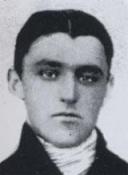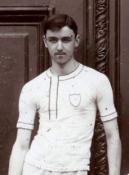
War Memorial
| Captain Meyrick Whitmore PAYNE Order of the Nile | |
|
18th (Service) Battalion Royal Fusiliers (City of London Regiment) attached to the Army Service Corps Date of birth: 10th May 1885 Date of death: 2nd June 1963 Died aged 78 Unknown |

|
| Meyrick Whitmore Payne was born at "Bancroft", Parsons Green in London on the 10th of May 1885 the second son of Arthur John Lynch Payne, a merchant, and Grace Emily (nee Whitmore) Payne later of 83 Thicket Road, Penge in South East London. He was educated at Hazelwood School until December 1898 where he was a member of the Choir and was a member of the Cricket XI in 1896, 1897 and 1898. He was a member of the Football XI in 1896, 1897 and 1898 when he was Captain. The school magazine wrote the following of his 1896 cricket season: - "Has a bad fault or two to get rid of, but promises very well, is too satisfied with lofty strokes and a crooked bat at present, but has played more than one good innings. A good field and almost safe catch at point." They wrote of his 1896 football season: - "Also only wants to play with more judgement and fewer antics to be another fine full back." And the following on his 1897 football season: - "Full back (right, much improved, especially in the matter of "kicking out", but can hardly be called safe, though he always showed up best in a match. A poor tackler and must learn to head the ball." They wrote of his 1898 football season: - " Full back (left), very seldom plays a whole game through, up to his best form, a good kick but wants more stubbornness in tackling." Of his 1897 cricket season they wrote: - "Has plenty of batting in him as his excellent average shows, and will without doubt make a great batsman. He has a beautiful off stroke, but is forward play lacks power, and his leg side is also rather a weak one. A fair wicket keeper when he exerts himself." They wrote of his 1898 cricket season: - "With all the powerful hitting of last year, and improved defence, he is one of the most promising of batsmen. He is still rather weak in forward play, and is capable of jumping about to a difficult ball; but he has developed a lovely cut and can drive beautifully. A very fair wicket keeper, and fine field." When he left the school the magazine wrote the following of him: - "Follows his brother to Wellington, where he has taken an excellent place, the highest we believe, yet taken by a Hazelwood boy. He was first in the German paper. he is one of the best, if not the best, bats we have ever had, and a very useful member of the Football XI, a shining light in the Choir, and an actor of no mean capacity." He went on to Wellington College where he was in Anglesey House from January 1899 to 1903. He was a member of the Cricket XI from 1901 to 1903 and was Captain in 1902 and 1903. He was appointed as a Prefect in 1901 and also played Racquets for the school, representing them at the Public Schools Racquet Competition at the Queen's Club in 1903. He was Victor Ludorum in 1903. He went on to Trinity College Cambridge in 1903 where, in his first year, he scored 102 against the MCC at Lords winning his “Blue” in 1904. He also toured the United States and Canada in 1905 as part of E.W Mann’s all amateur team. He served as Secretary to the Cambridge University Cricket Club in 1906 and was their Captain in 1907. He went on to play county cricket as a wicketkeeper for Middlesex representing them twenty five times between 1904 and 1909. He was a playing member of the MCC from 1905 to 1925 and during his career he scored 3,547 first class runs at an average of 24.80. As a wicketkeeper he played a part in 152 dismissals, 120 caught and 32 stumped. On leaving university in 1907 he was employed with the Egyptian Civil Service where he worked in the Sudan. He was married at a Registry Office to Charlotte Evelyn (nee Nixon) on the 11th of September 1907 and had two daughters, Iris Winifred, born at Pimlico on the 17th of June 1908 and Rhoda Evelyn born at North Gate in April 1913. He later had a son, Anthony Denys Philpotts who was born on the 19th of March 1924. The family lived at 28 Bramham Gardens, London S.W.5 By 1911 he was working back in England as a clerk to a grain dealer at 87A Leadenhall Street in the City of London. Following the outbreak of war he enlisted at Westminster as Private 1907 in the 18th (Service) Battalion Royal Fusiliers (City of London Regiment), University and Public School Corps on the 15th of September 1914. At a medical examination, which took place on the same day, it was recorded that he was six feet and one half an inch tall and that he weighed 168lbs. It was also recorded that he had a dark complexion, black hair and grey eyes. He was promoted to Corporal on the 27th of October 1914 and to Sergeant on the 1st of November 1914. He was commissioned as a 2nd Lieutenant in the battalion on the 1st of January 1915 and embarked for France with his battalion from Folkestone on board the SS "Princess Victoria" at 8.15am on the 14th of November 1915. They were due to land at Boulogne but due to floating mines they diverted to Calais where they disembarked at 11.15am. He was appointed as Battalion Adjutant. He later transferred to the Army Service Corps and was appointed as a Staff Captain to Number 12 District at Cork in Ireland on the 19th of July 1916. Following that posting he was attached to the Egyptian Army for service with the Sudanese Government and was mentioned in despatches. He was struck off the strength of the Egyptian Army on the 27th of July 1919 and was demobilised on the 10th of August 1919. He relinquished his commission on the 19th of August 1919, leaving the army with the rank of Captain. He was awarded the Order of the Nile Fourth Class on the 19th of April 1921. After the war he worked as a grain dealer in the City of London with Payne and Routh & Co, a partnership which was dissolved on the 15th of September 1926. He later worked for Lever Brothers Ltd and, later still, he became a member of the Stock Exchange, having offices at 73 Bishopsgate, London EC3. He lived at "Greyfriars", Tilford in Surrey. He was a member of the MCC and of the United University Club. He died at Little Easton in Essex. |
|
 | |
| Went on to Wellington College |
Back